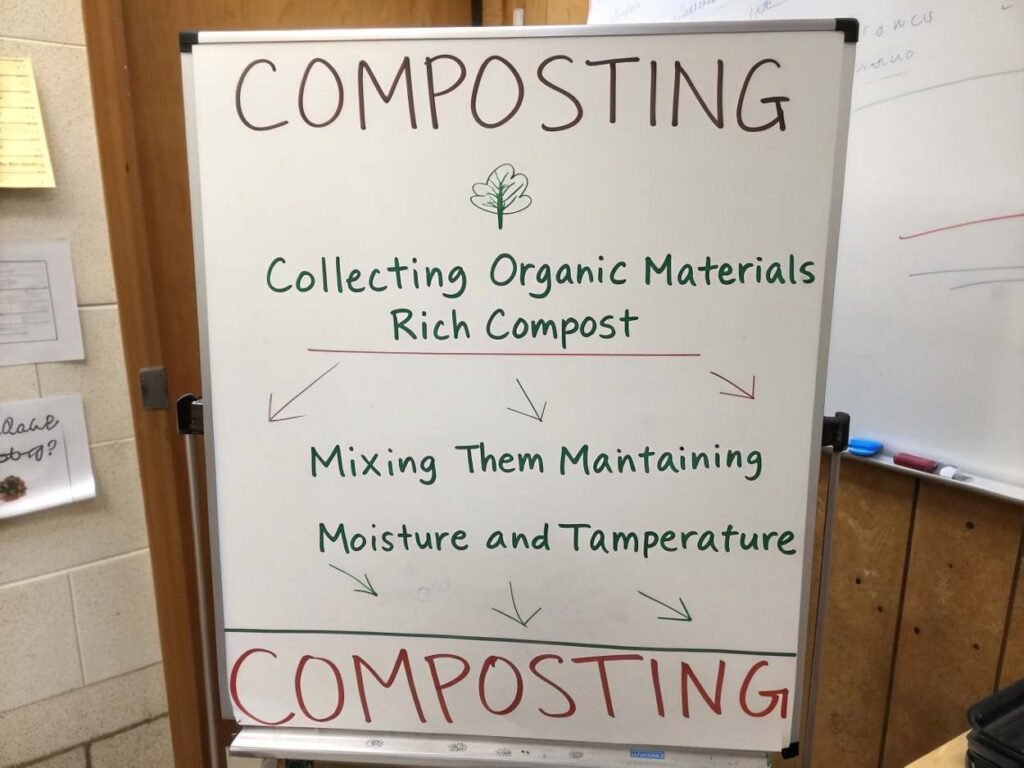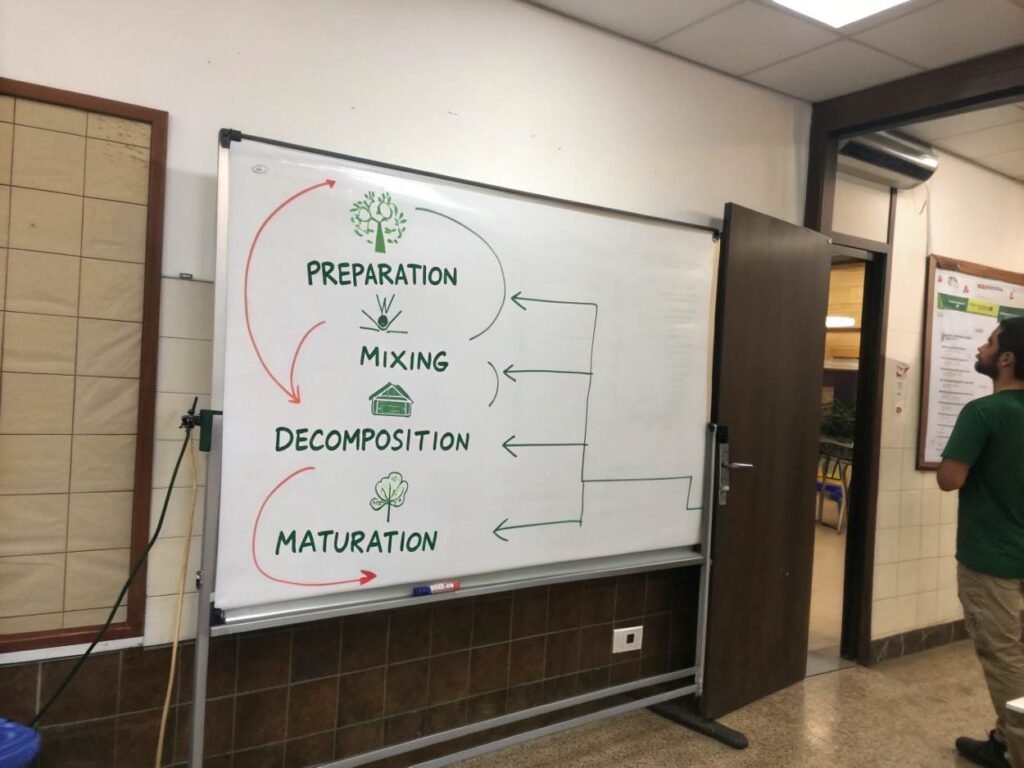Wondering how composting benefits the environment? Composting transforms food and yard waste into a sustainable solution that reduces landfill waste, reduces greenhouse gas emissions, and nourishes the soil.
Whether you’re pursuing a zero waste lifestyle or exploring a sustainable way to live, this guide will give you science-backed insights into the environmental benefits of composting. With OrizonBio’s compostable trash bags, you can easily start composting and do your part for a greener planet. Let’s take a deeper look at how composting can contribute to a healthy environment!
What is composting?
Composting is the process of breaking down organic waste management materials (such as vegetable peelings, coffee grounds, or yard waste) into nutrient-rich fertilizer through microorganisms. By placing "green" materials (such as composted food scraps) in your compost bin along with "brown" materials (such as dry leaves, cardboard), you create a balanced environment that is conducive to microbial growth.

Environmental Benefits of Composting
Reduce landfill waste
Organic waste, such as food scraps and yard waste, accounts for 30% of household waste in the United States (EPA, 2025). In landfills, this waste takes up space and decomposes anaerobically, producing harmful gases. Composting can reduce household waste by 20-30%, supporting approaches to reduce landfill waste.
Reduce greenhouse gas emissions
Landfills release methane, a greenhouse gas that is 25 times more potent than carbon dioxide (EPA). How composting reduces landfill waste can directly reduce methane production, which helps reduce greenhouse gas emissions. The EPA estimates that widespread composting could reduce emissions by the equivalent of removing 2 million cars from the road each year, making it an important solution to climate change.
Improve soil health
Compost is a natural fertilizer that is rich in nutrients such as nitrogen and phosphorus. Unlike synthetic fertilizers, it enhances soil fertility, promotes microbial activity, and prevents soil erosion. According to a 2024 USDA study, compost-amended soil retains 20% more nutrients, reducing fertilizer runoff pollution and promoting the benefits of organic gardening.
Saves Water
Compost improves soil water retention, reducing irrigation needs by up to 30% (USDA). By composting, you can conserve water, which is critical in drought-prone areas. By supporting sustainable agriculture, composting can reduce water stress, benefiting your garden and the planet.

How Does Composting Work?
In landfills, organic waste undergoes anaerobically decomposing, releasing methane. Composting, on the other hand, promotes aerobic decomposition, where microorganisms use oxygen to break down waste, producing less harmful carbon dioxide and nutrient-rich compost.
Composting also promotes soil carbon sequestration, storing carbon for decades. A 2023 study in Environmental Science and Technology found that composted soil can act as a carbon sink, thereby mitigating climate change. By reducing reliance on fertilizers, composting further reduces energy-intensive production and water pollution, in line with environmental sustainability.
Composting vs Recycling: Which Is Greener?
Wondering how composting compares to recycling? Both are essential sustainable waste disposal methods, but they target different waste types:
- Composting: Excels for organic waste like food scraps and yard waste, reducing methane and offering benefits of composting for soil.
- Recycling: Suits inorganic materials like plastic and paper, saving 70% of energy in plastic production (EPA) and supporting recycling benefits for environment.
Composting vs recycling isn’t a competition—combine them for maximum impact. Recycle bottles and compost peels using OrizonBio’s compostable trash bags. Explore our guide on Recycling vs Composting for more.

How to Start Composting and Lower Your Carbon Footprint
Choose a system: Opt for a backyard compost bin ($50-200) or an apartment countertop compost bin.
Collect trash: Collect compostable trash, such as vegetable peelings, coffee grounds, and eggshells. Avoid meat or greasy foods.
Use compostable bags: Fill your compost bin with BPI-certified compost bags, such as OrizonBio’s biodegradable trash bags, to keep your compost clean.
Balance your materials: Mix green and brown compost materials, such as food scraps and leaves, in a 2:1 ratio.
Turn regularly: Turn your compost bin once a week to aerate, speed decomposition, and reduce odors.
Apartment tip: Use 4-gallon compost bin liners and transfer them to a community composting program. OrizonBio’s 4-gallon compost bags are perfect for small spaces.
Conclusion
How does composting help the environment? It slashes landfill waste, lowers greenhouse gas emissions, enriches soil, and conserves water, making it a cornerstone of green living ideas. Start your compost bin setup guide with OrizonBio’s compostable trash bags in 4, 8, or 13-gallon sizes to amplify your impact.
FAQ
How does composting reduce greenhouse gas emissions?
Composting diverts organic waste from landfills, reducing methane emissions, a gas 25 times more potent than CO2.
What are the best compostable trash bags?
BPI-certified compost bags, like OrizonBio’s biodegradable trash bags, ensure eco-friendly decomposition.
Can I compost in an apartment?
Yes, use a caddy with 4-gallon compost bags and transfer to community composting programs.
How does composting improve soil health?
Compost adds nutrients, supports microbes, and prevents soil erosion, reducing chemical fertilizer use.
Is composting better than recycling for the environment?
Composting suits organic waste, reducing methane; recycling saves energy for inorganic materials. Both support reduce, reuse, recycle, compost.
{ "@context": "https://schema.org", "@type": "FAQPage", "mainEntity": [ { "@type": "Question", "name": "How does composting reduce greenhouse gas emissions?", "acceptedAnswer": { "@type": "Answer", "text": "Composting diverts organic waste from landfills, reducing methane emissions, a gas 25 times more potent than CO2." } }, { "@type": "Question", "name": "What are the best compostable trash bags?", "acceptedAnswer": { "@type": "Answer", "text": "BPI-certified compost bags, like OrizonBio’s biodegradable trash bags, ensure eco-friendly decomposition." } }, { "@type": "Question", "name": "Can I compost in an apartment?", "acceptedAnswer": { "@type": "Answer", "text": "Yes, use a caddy with 4-gallon compost bags and transfer to community composting programs." } }, { "@type": "Question", "name": "How does composting improve soil health?", "acceptedAnswer": { "@type": "Answer", "text": "Compost adds nutrients, supports microbes, and prevents soil erosion, reducing chemical fertilizer use." } }, { "@type": "Question", "name": "Is composting better than recycling for the environment?", "acceptedAnswer": { "@type": "Answer", "text": "Composting suits organic waste, reducing methane; recycling saves energy for inorganic materials. Both support reduce, reuse, recycle, compost." } } ] }





